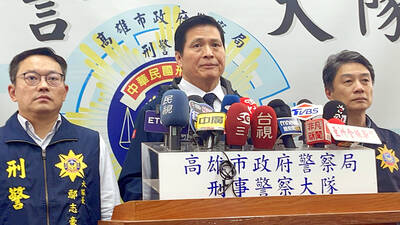The Higher Education Evaluation and Accreditation Council of Taiwan yesterday publicized the result of college evaluations for the second half of last year’s academic year, putting 30 academic departments and graduate schools on the observation list.
Roger Chen (陳振遠), president of the council, told a press conference that 93.4 percent of the 266 academic departments and graduate schools at the eight universities that participated in the evaluation passed the assessment.
Departments and institutes at Soochow University, Ming Chuan University, Feng Chia University and Kaohsiung Medical University generally performed well on the evaluation because the schools had given priority to teaching, Chen said.
WATCH LIST
However, 30 academic departments and graduate schools, the majority of which were graduate institutes, were placed on the observation list and needed further assessment, Chen said.
Most of these departments or institutes were affiliated with National Cheng Kung University (NCKU) and National Central University (NCU), both of which prioritize research, Chen said.
Chen said evaluators found that some universities put too much emphasis on the output of research while failing to stress teaching.
“The result of the evaluation also reflects the general lack of adequate teaching staff in public universities,” Chen said.
Vice Minister of Education Lin Tsung-ming (林聰明) said at a separate setting that universities should never prioritize academic research to the point of ignoring the importance of teaching.
DEFENSE
Lai Ming-chiao (賴明詔), president of NCKU — which had 13 departments and institutes on the observation list — defended the quality of the school’s teachers and their teaching performance.
Lai said the school had established 23 new departments and institutes over the years in a bid to meet the needs of the government, but the Ministry of Education had refused to allow the school to employ more teachers.
This made it difficult for the school to provide adequate teaching staff for the new departments or institutes, Lai said.
Liu Gin-rong (劉振榮), vice president of NCU, criticized the evaluation, saying the school spends about NT$120 million (US$3.6 million) of its funding every year on boosting its teaching performance.

Twenty-four Republican members of the US House of Representatives yesterday introduced a concurrent resolution calling on the US government to abolish the “one China” policy and restore formal diplomatic relations with Taiwan. Led by US representatives Tom Tiffany and Scott Perry, the resolution calls for not only re-establishing formal relations, but also urges the US Trade Representative to negotiate a free-trade agreement (FTA) with Taiwan and for US officials to advocate for Taiwan’s full membership in the UN and other international organizations. In a news release announcing the resolution, Tiffany, who represents a Wisconsin district, called the “one China” policy “outdated, counterproductive

Actress Barbie Hsu (徐熙媛) has “returned home” to Taiwan, and there are no plans to hold a funeral for the TV star who died in Japan from influenza- induced pneumonia, her family said in a statement Wednesday night. The statement was released after local media outlets reported that Barbie Hsu’s ashes were brought back Taiwan on board a private jet, which arrived at Taipei Songshan Airport around 3 p.m. on Wednesday. To the reporters waiting at the airport, the statement issued by the family read “(we) appreciate friends working in the media for waiting in the cold weather.” “She has safely returned home.

TRUMP ERA: The change has sparked speculation on whether it was related to the new US president’s plan to dismiss more than 1,000 Joe Biden-era appointees The US government has declined to comment on a post that indicated the departure of Laura Rosenberger as chair of the American Institute in Taiwan (AIT). Neither the US Department of State nor the AIT has responded to the Central News Agency’s questions on the matter, after Rosenberger was listed as a former chair on the AIT’s official Web site, with her tenure marked as 2023 to this year. US officials have said previously that they usually do not comment on personnel changes within the government. Rosenberger was appointed head of the AIT in 2023, during the administration of former US president Joe

ON PAROLE: The 73-year-old suspect has a criminal record of rape committed when he was serving in the military, as well as robbery and theft, police said The Kaohsiung District Court yesterday approved the detention of a 73-year-old man for allegedly murdering three women. The suspect, surnamed Chang (張), was arrested on Wednesday evening in connection with the death of a 71-year-old woman surnamed Chao (趙). The Kaohsiung City Police Department yesterday also unveiled the identities of two other possible victims in the serial killing case, a 75-year-old woman surnamed Huang (黃), the suspect’s sister-in-law, and a 75-year-old woman surnamed Chang (張), who is not related to the suspect. The case came to light when Chao disappeared after taking the suspect back to his residence on Sunday. Police, upon reviewing CCTV